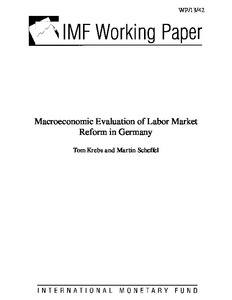Macroeconomic evaluation of labor market reform in Germany
"In 2005 the German government implemented the so-called Hartz IV reform, which amounted to a complete overhaul of the German unemployment insurance system and resulted in a significant reduction in unemployment benefits for the long-term unemployed. In this paper, we use an incomplete-market m...
| Main Authors: | , |
|---|---|
| Institution: | ETUI-European Trade Union Institute |
| Format: | TEXT |
| Language: | English |
| Published: |
Washington, DC
2013
IMF |
| Subjects: | |
| Online Access: | https://www.labourline.org/KENTIKA-19128218124919464909-Macroeconomic-evaluation-of-la.htm |
| Summary: | "In 2005 the German government implemented the so-called Hartz IV reform, which amounted to a complete overhaul of the German unemployment insurance system and resulted in a significant reduction in unemployment benefits for the long-term unemployed. In this paper, we use an incomplete-market model with search unemployment to evaluate the macro-economic and welfare effects of the Hartz IV reform. We calibrate the model economy to German data before the reform and then use the calibrated model economy to simulate the effects of Hartz IV. In our baseline calibration, we find that the reform has reduced the long-run (noncyclical) unemployment rate in Germany by 1.4 percentage points. We also find that the welfare of employed households increases, but the welfare of unemployed households decreases even with moderate degree of risk aversion." |
|---|---|
| Physical Description: | 37 p. Digital |

